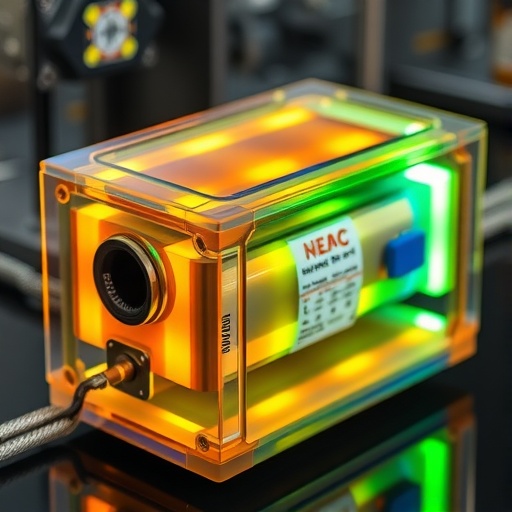In a groundbreaking advancement in energy technology, researchers led by M.K. Singla alongside colleagues M. Ali and R. Kumar have made significant strides in optimizing the performance of proton exchange membrane (PEM) fuel cells. Their noteworthy publication, set to appear in the esteemed journal Ionics, unveils an innovative adaptive differential evolution algorithm. This new methodology integrates a deeply-informed mutation strategy and a restart mechanism optimized for enhanced parameter identification of PEM fuel cells, which, as the research demonstrates, could revolutionize the efficiency and application of these vital energy systems.
PEM fuel cells have emerged as a frontrunner in sustainable energy solutions, primarily due to their high efficiency and quick start-up times. Despite their advantages, the effective identification of parameters that influence their performance has posed considerable challenges in the field. Traditional methods often fall short, leading to suboptimal performance and inefficiencies. The team’s research addresses these issues directly, proposing a novel algorithmic approach tailored to refine the parameter identification process, which is fundamental for the maximum exploitation of fuel cell technology.
The adaptive differential evolution algorithm introduced in the study stands out due to its unique ability to adjust its parameters dynamically. This adaptability offers a marked advantage over existing methods, which typically employ static parameters for optimization, resulting in less flexibility and efficacy. By implementing a deeply-informed mutation strategy, the researchers enhance the algorithm’s capability to explore a broader solution space. This strategic mutation allows the algorithm to escape local optima, driving it toward a more globally optimal solution.
Notably, the incorporation of a restart mechanism in the algorithm represents a pivotal enhancement. During the optimization process, it is common for algorithms to converge prematurely, leading to stagnant results. The restart mechanism ensures that the search process can be revived at intervals, thus maintaining momentum and preventing the optimization from becoming trapped in less desirable solutions. This dual approach of deeply-informed mutation combined with the restart mechanism not only enhances performance but also allows for a more robust and reliable solution under varying conditions.
The implications of this research extend far beyond mere academic discovery; they represent a significant step toward the practical application of PEM fuel cells in real-world scenarios. By facilitating a more accurate parameter identification process, the advancements highlighted in this study could lead to more efficient fuel cell designs, ultimately driving down costs and making sustainable energy more accessible. This could be instrumental in applications ranging from automotive technologies to stationary power generation, where performance and efficiency are paramount.
The research team conducted a series of rigorous experiments to validate the performance of their adaptive differential evolution algorithm. The results demonstrated marked improvements when compared to traditional optimization methods. These experiments underscored not only the algorithm’s capacity to accurately identify crucial parameters, but also its effectiveness in optimizing fuel cell performance across a variety of operational conditions. The empirical evidence solidifies the algorithm’s place as a transformative tool in the field of fuel cell technology.
Moreover, the findings illuminate the broader challenges that researchers face in optimizing energy systems. As the push for more sustainable energy solutions intensifies globally, the demand for innovative methodologies to enhance energy system efficiencies becomes increasingly critical. This research not only addresses the specific challenges within PEM fuel cells but also sets a precedent for the application of advanced computational techniques in other sectors of energy technology.
Fully understanding the potential impacts of these findings requires consideration of the environmental context in which hydrogen fuel cells operate. With rising global energy demands and pressing calls for carbon neutrality, technologies like PEM fuel cells are positioned to play a pivotal role in transitioning to cleaner energy sources. The advancements articulated in this study contribute to this pressing agenda by making these technologies more reliable and efficient.
The adaptive differential evolution algorithm also integrates seamlessly with existing computer-aided design tools and simulation environments, making it an attractive option for engineers and designers. This interoperability can expedite the integration of these advanced optimization techniques into ongoing research and development efforts within the energy sector, allowing for more rapid advancements and widespread implementation of PEM fuel cells.
Feedback from peer reviewers and industry experts has been overwhelmingly positive, indicating that the proposed algorithm represents a substantial leap forward in fuel cell research. With the potential for commercial adoption on the horizon, the study promises to inspire further research and collaboration across disciplines, ultimately propelling the development of fuel cell technology into a new era of efficiency and effectiveness.
In conclusion, the innovative work by Singla, Ali, and Kumar marks a watershed moment for the field of fuel cell research. Their development of an adaptive differential evolution algorithm, enhanced by a deeply-informed mutation strategy and a restart mechanism, has significant implications for the optimization of PEM fuel cells. This research not only paves the way for future advancements in fuel cell technologies but also contributes to the broader conversation about sustainable energy solutions in our rapidly changing world.
As we look to the future, the path is clear. Continued research and exploration in this realm will undoubtedly yield further insights, paving the way for even greater advancements in the effectiveness of PEM fuel cells and, by extension, our ability to harness hydrogen as a clean energy source.
Subject of Research: Optimizing Parameter Identification of PEM Fuel Cells
Article Title: Revolutionizing Parameter Identification of PEM Fuel Cell Using Adaptive Differential Evolution Algorithm Based on Deeply-Informed Mutation Strategy and Restart Mechanism Optimization
Article References:
Singla, M.K., Ali, M., Kumar, R. et al. Revolutionizing parameter identification of PEM fuel cell using adaptive differential evolution algorithm based on deeply-informed mutation strategy and restart mechanism optimization.
Ionics (2025). https://doi.org/10.1007/s11581-025-06601-w
Image Credits: AI Generated
DOI: https://doi.org/10.1007/s11581-025-06601-w
Keywords: PEM fuel cells, adaptive differential evolution, parameter identification, energy technology, sustainable energy systems




